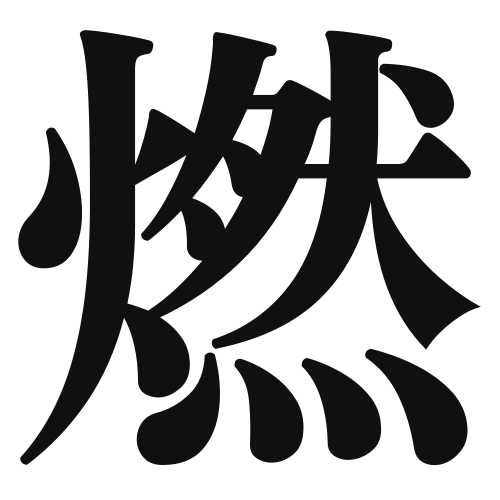1. Overview of Meaning
The kanji “燃” (nen) means “to burn” or “to ignite.” It is often associated with fire and combustion, representing the action of something being consumed by flames.
2. Formation and Radical
Formation of the Kanji: The kanji “燃” is a phonetic-ideographic character (形声文字). It combines the radical for fire (火) with the phonetic component “然,” which suggests the sound and meaning related to burning.
Radical: The radical of “燃” is 火 (hi), which means “fire.” This radical is commonly found in kanji related to heat and flames.
3. Examples of Usage
Common Words and Phrases:
- 燃料 (ねんりょう, nenryou) – fuel
- 燃焼 (ねんしょう, nenshou) – combustion
- 燃える (もえる, moeru) – to burn
Example Sentences in Daily Conversation:
- この木は簡単に燃えます。 (このきはかんたんにもえます。) – This wood burns easily.
- キャンプファイヤーを燃やしましょう。 (キャンプファイヤーをもやしましょう。) – Let’s start the campfire.
4. Synonyms and Antonyms
Similar Kanji:
- 焼 (やき, yaki) – to grill or roast; while both “燃” and “焼” involve fire, “焼” specifically refers to cooking or heating food.
Opposite Kanji:
- 消 (けす, kesu) – to extinguish; this kanji represents the action of putting out a fire, contrasting with “燃,” which means to ignite.
5. Cultural and Historical Background
Relation to Japanese Culture: Fire has significant cultural importance in Japan, often associated with purification and rituals. The kanji “燃” is frequently used in contexts related to festivals and traditional ceremonies involving fire.
Proverbs and Idioms:
- 燃え尽きる (もえつきる, moetsukiru) – to burn out; this phrase is used to describe someone who has exhausted their energy or passion.
